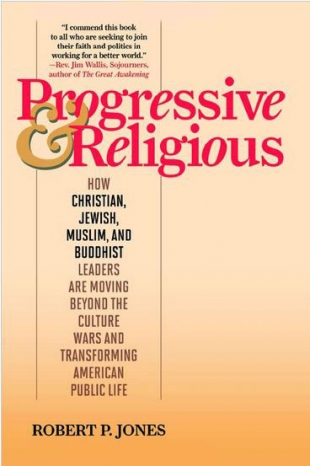Robert P. Jones is president of Public Religion Research, a consulting firm advising national advocacy groups, and visiting fellow in religion at Third Way, a progressive think tank. With great élan and spunk, he has completed a three-year project of interviewing 100 Jewish, Christian, Muslim, and Buddhist leaders. The result is a book that presents a glimpse of the emerging face of religion in a new era in America which E. J. Dionne and others have dubbed "a post-religious right America." Here are progressives who are deeply rooted in religious traditions, "voices that unite rather than divide; and voices that demand attention to a broader agenda of peace, social justice, care for the environment, respect for pluralism, and the common good."
For years, the religious right, comprised mainly of white evangelicals within the Republican Party, have dominated the media with their political views and wedge issues such as abortion, same-sex marriage, and embryonic stem cell research. The excesses of the Christian right have spawned a series of vitriolic antireligious books. Conspicuously absent are liberal religious voices. Jones maintains that an authentic new movement has arisen that is very different from the still vocal Christian right and the reactionary antirelgious left.
In a chapter titled "Lifting the Line of History: How Progressive Jews Are Healing the World," the author claims that Judaism presently has "the strongest and most engaged progressive voice." He talks about tikkun olam and the challenge of repairing the broken world. The sacred texts used to energize social justice issues are Genesis 1 (Creation in the Image of God), the Exodus story of liberation, and Isaiah 58 where holiness refers to an ethical orientation toward just acts. In addition to working for the alleviation of poverty and the support for LGBT equality, many Jews have joined Rabbi Michael Lerner's Network of Spiritual Progressives. On the international front, this organization calls for a "Global Marshall Plan" and "an ethical way to end the war in Iraq."
In other chapters, Jones covers three other religions: "More Truth Breaking Out: How Progressive Christians Are Seeking the Reign of God on Earth"; "Knowing One Another: How Progressive Muslims Are Fostering Justice, Beauty, and Pluralism"; and "Just Sitting Down: How Progressive Buddhists Are Being Peace and Embodying Justice." The author shares five common characteristics of a progressive religious orientation:
• An emphasis on social justice
• A relational approach to truth
• A rigorous and critical engagement with tradition
• A belief in the unity of all humanity
• A new vision of America that emphasizes interdependence, generosity, and prophetic critique
Jim Wallis has called the new energy among progressive voices a "great awakening." Jones does a fine job of mapping this new movement which offers an alternative to the present day national mood of fear and self-interest.
